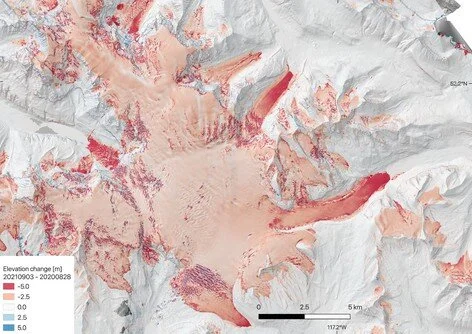The Liberal government tabled much-anticipated legislation Monday that aims to improve water quality in First Nations communities, improve collaboration on water protection and codify a new First Nations-led commission. The long-promised bill, which Indigenous Services Minister Patty Hajdu is touting as the result of immense collaboration and knowledge-sharing, would apply a new framework for source water, drinking water, wastewater and related infrastructure on First Nations land.
'Bad year for the glaciers': Climate change threatens glacier behind Edmonton's water source
The province is long past the oppressive “heat dome” that caused cities to swelter last summer, but warmer temperatures this year had a lasting effect on the glacier that feeds Edmonton’s water supply. The Saskatchewan Glacier terminus saw 10 metres of thinning this year, said Brian Menounos, an earth sciences professor at the University of Northern British Columbia and Canada Research Chair in glacier change. It’s also the glacier that feeds the North Saskatchewan River, Edmonton’s sole source of drinking water.
Winnipeg's drinking water source of frustration for northern Ontario Indigenous community
About 100 million litres of fresh water flows west to the city of Winnipeg every day but the struggling Indigenous people who live on the shores of Shoal Lake say no benefits have ever flowed east to them. Compensation is decades overdue, they say, and they're now hoping favourable developments in their $500-million lawsuit against the city and the province of Ontario will tilt the odds their way.
First Nations workers in Sask. sacrifice wages, vacation to run underfunded water systems
Rebecca Zagozewski is the executive director of the Saskatchewan First Nations Water Association, a non-profit organization that works to build First Nations’ capacity to take care and control of their own water services. She says recruitment and retention of water treatment plant operators is a “real problem” on Saskatchewan First Nations, largely because they often can’t pay operators competitive wages.
Testing the waters: Do Regina's asbestos-cement water mains pose a risk?
Snaking beneath Regina's streets are 600 kilometres of water mains built with asbestos-cement. That's about 60 per cent of some 1,000 kilometres of the mains that deliver water to homes around the city. Increasingly, some scientists and communities are questioning the wisdom in having drinking water flowing through pipes constructed from asbestos fibres.







